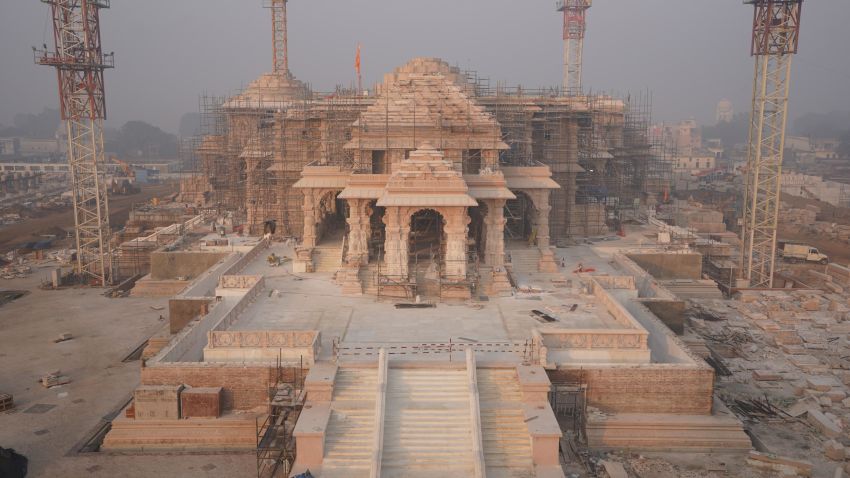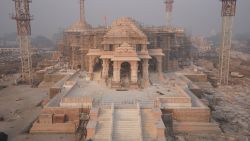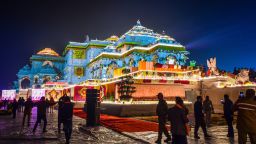Millions tuned in across India to watch the opening of a vast Hindu temple on Monday, in a ceremony considered to be the crowning moment for Prime Minister Narendra Modi’s Hindu nationalist ambitions months before he seeks to win a rare third term in elections.
The inauguration of the Ram Janmabhoomi Mandir – a temple devoted to Lord Ram – in northern India’s Ayodhya is more than 30 years in the making and is expected to give a major boost to Modi’s election campaign.
The Ram Mandir is the realization of Modi’s dream to create what he has called a “new India,” which many consider to be the transformation of the country into a distinctly Hindu nation.
For Modi’s detractors, the temple’s inauguration is the conclusion of a decades-long campaign to pull India away from the secular roots upon which the country was founded following independence.
“Today our Lord Ram has come. After centuries of waiting, our Ram has arrived. After centuries of unprecedented patience, countless sacrifices, renunciations, and penances, our Lord Ram has arrived,” Modi said in a speech to a 7,000-strong crowd that included movie stars, top cricket players and tycoons, from the newly-constructed temple bedecked with colorful flowers.
“Ram is not a dispute, Ram is the solution,” he added.
Monday’s ceremony fulfils a long-standing promise to voters by Modi and his Bharatiya Janata Party (BJP) government that propelled them to power in 2014.
For years, Modi and his political allies vowed to build a temple on the site of a 16th century mosque that was destroyed by violent Hindu hardliners in a deadly 1992 attack that turbo-charged the country’s Hindu nationalist movement.
The mosque’s demolition, spurred on by the BJP and other right-wing groups, catapulted the party into mainstream politics, winning a general election four years later.
Modi did not directly mention the Babri Masjid in his speech, nor the country’s Muslims, many of whom feel pain and sadness at the events that have unfolded in Ayodhya. He did speak of moving forward and “the beginning of a new time cycle.”
“From today, from this sacred time, we have to lay the foundation for the next 1,000 years. By moving ahead of building the temple, now we all take the oath of building a national, capable, successful, beautiful, and divine India,” Modi said.
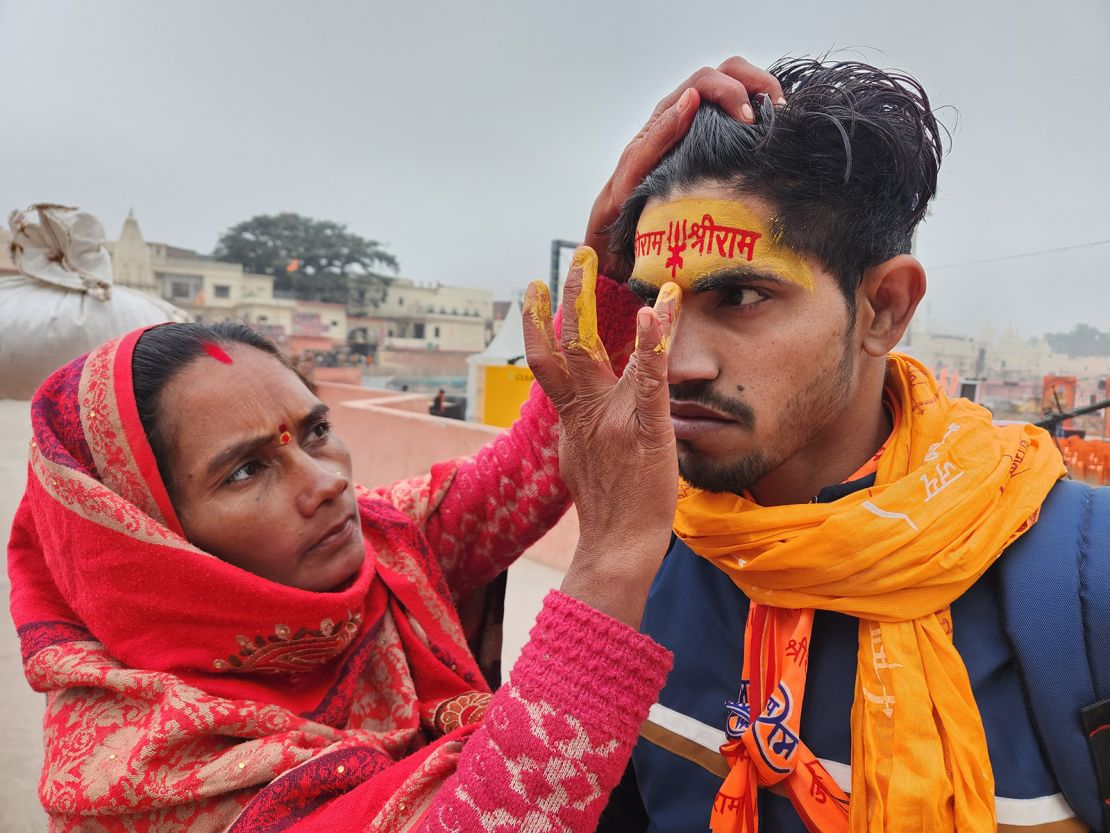
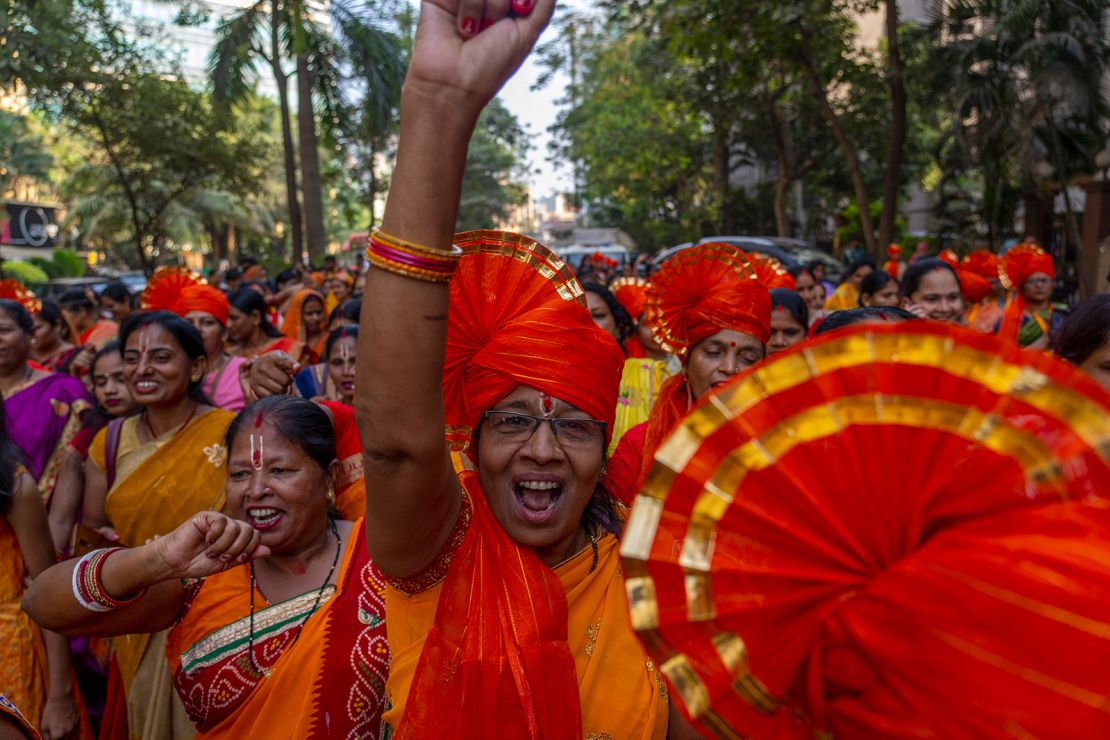
Inside the sanctum sanctorum of the temple Monday, Modi presided over the Pran Pratishtha, or consecration ceremony, of an idol of Lord Ram, one of Hinduism’s most revered deities. Depicted as a young boy, the statue of black stone was adorned with gold jewelry, gemstones, diamonds and flowers.
Outside, military helicopters flew over the temple and city releasing flower petals over the vast building and crowds of dignitaries below.
Among the speakers at the event was Mohan Bhagwat, chief of the Rashtriya Swayamsevak Sangh (RSS), the right-wing parent organization of the BJP, who said the temple “has become a symbol of a new India that will stand tall.”
“It has been said, and we know, that today in Ayodhya, along with Lord Ram, India’s self has returned,” he said.
Yogi Adityanath, the chief minister of Uttar Pradesh state where Ayodhya is located and one of the country’s most polarizing political figures, called the Ram Mandir India’s “national temple” and an “important ritual of cultural reawakening.”
Throughout the day, saffron flags flew high and marigold flowers adorned building entrances as tens of thousands of devotees thronged the streets of the ancient town in celebratory processions.
“For 500 years Lord Ram was living in a hut,” devotee Acharya Mohanjodaro Bharadwaj told CNN, referring to the moment the Mughal-era mosque was built. “Today Modi made him sit inside a temple, the whole country is celebrating it like it’s Diwali.”
Celebrations were held across the country, with politicians encouraging people to take part in festivities in their homes and temples, ensuring it would be a national event.
Uttar Pradesh declared Monday a public holiday, with schools and liquor shops closed across the state.
Hundreds of members of the Indian diaspora gathered in New York on Sunday to celebrate the inauguration under a massive image of Lord Ram projected on a screen in Times Square. Indian embassies around the world hosted watch parties.
Controversy
While millions of Hindus celebrated the opening of the much-awaited complex, which is seen by them as the birthplace of Ram, for the country’s minority Muslim population, it’s a painful reminder of religious divisions they fear are becoming more pronounced under Modi’s BJP government.
The site of the temple was once home to the Babri Masjid, a 16th century mosque, built during the Mughal empire that ruled India from 1526 to 1858.
But the location has been disputed for decades.
Many Hindus believe the mosque was built on the ruins of a Hindu temple, allegedly destroyed by Babar, the first Mughal emperor of South Asia.
In 1992, spurred on by the BJP and other right-wing groups, Hindu hardliners attacked the mosque, triggering widespread communal violence that killed more than 2,000 people nationwide.
The violence was some of the worst seen in India since the bloody clashes that accompanied partition following independence in 1947.
In the following years, Hindu nationalists rallied to build the Ram Mandir on the site of the destroyed mosque, setting the stage for an emotional and politically charged showdown that lasted decades.
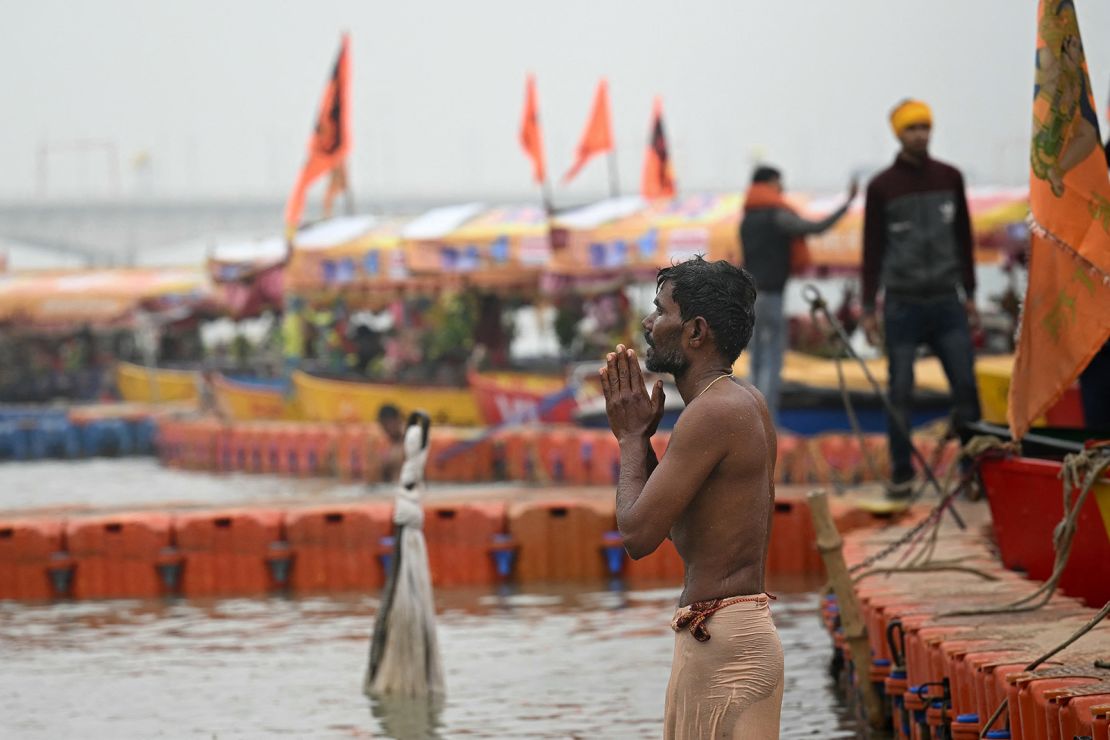
India’s Supreme Court in 2019 granted Hindus permission to build the temple on the contested site, effectively ending the dispute. It was seen as a victory for Modi and his supporters but was a blow to many Muslims for whom the destruction of the Babri Masjid remains a source of deep tension and historic loss.
Ayodhya is home to some 3 million people, including about 500,000 Muslims – and some of them are fearful of attacks on the day of the temple’s inauguration.
Many have shared messages of support to one another on social media, with WhatsApp messages urging the community to refrain from traveling on public trains and buses for their own safety.
Maulana Badshah Khan, 65, recently told CNN he will be staying home on Monday.
“The wounds of Babri Mosque’s demolition will always be there. Even if we feel despondent about voicing them,” Khan said. “The temple holds the symbolic value of showing the Muslims their place in New India.”
‘Blurred lines’ between religion and state
Others have accused Modi of “weaponizing” the Hindu faith and using the Ram Temple for political gain.
“Objections include the fact that Modi is not a religious leader and so not qualified to lead the ceremony, and that a Hindu temple cannot be consecrated before it is completed,” said a statement from Hindus for Human Rights, a US-based non-profit advocacy group.
Modi “rushing through and fronting it himself is the latest attempt to weaponize Hinduism in the name of the BJP’s repressive nationalist ideology, ahead of national elections in May,” the statement added.
Modi rose to power in 2014 with a pledge to reform the country’s economy and usher in a new era of development – but he also heavily pushed a Hindutva agenda, an ideology that believes India should become a land for Hindus.
His promise to build the Ram Mandir helped spur that initial election success.
Monday’s temple opening is widely expected to boost Modi’s chances of winning a rare third term in a general election expected later this year, having made true on his promise to millions of voters.
In the run up to the inauguration, Modi fasted and prayed in an 11-day ritual steeped in Hindu religious symbolism. As part of the rituals, Modi visited shrines and temples linked to Lord Ram across the country.
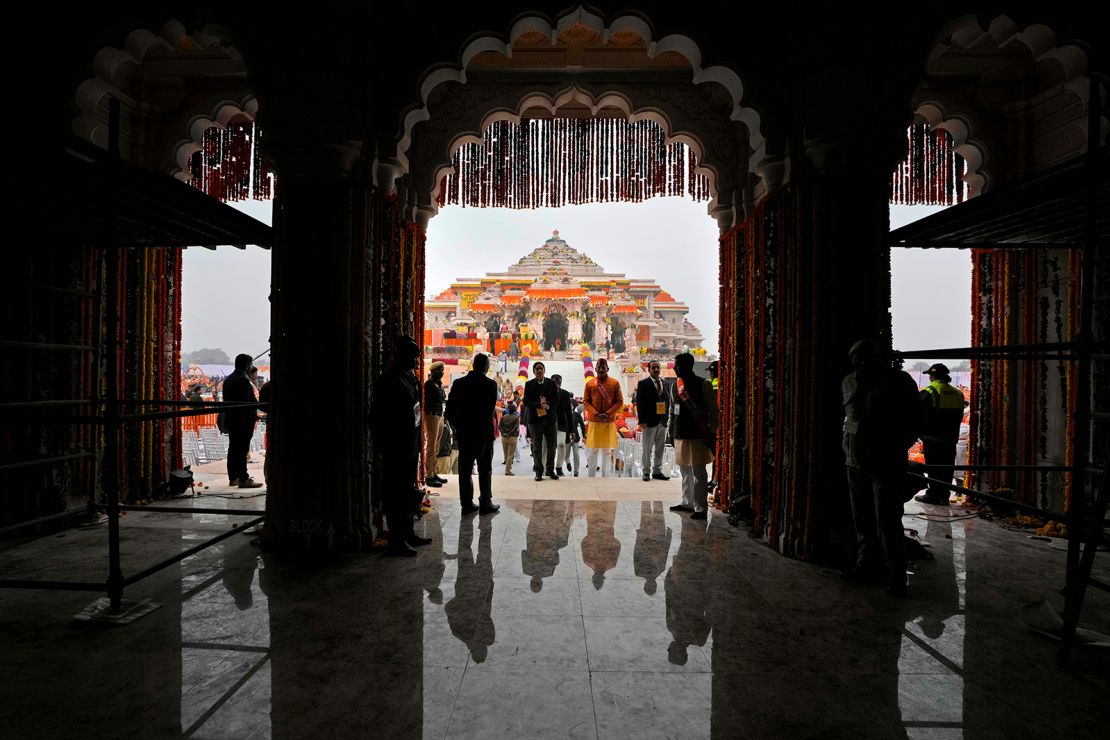
“The Lord has made me an instrument to represent all the people of India during the consecration,” he said in a recorded message on his YouTube channel.
On Sunday, Modi posted a video of himself to social media site X walking into the sea and submerging himself under the water at the Arulmigu Ramanathaswamy Temple in southern Tamil Nadu state.
Nilanjan Mukhopadhyay, author of “The Demolition and the Verdict,” a book about the 1992 mosque demolition, said Modi’s decision to preside over Monday’s festivities is a sign of “Hindu hegemony” in India.
“Lines between politics and religions have got blurred,” he said of Modi’s involvement in the ceremony in a country that is constitutionally secular.
“They have also got completely blurred between religion and the Indian state. You have at the moment the Indian prime minister who is actually participating in a purely religious activity, with full participation of the government machinery.”
Hindu devotees flock to witness inauguration
The temple doesn’t open to the public until Tuesday but it is expected to draw vast crowds once that happens, and thousands of devotees were already in town on Monday.
Among those who made the journey was 90-year-old Urmila Chandravanshi, who traveled more than 700 kilometers (435 miles) from the central state of Chhattisgarh.
Clapping and chanting “victory to Lord Ram,” she said she was thrilled to be in Ayodhya and credited Modi for the opening of the temple.
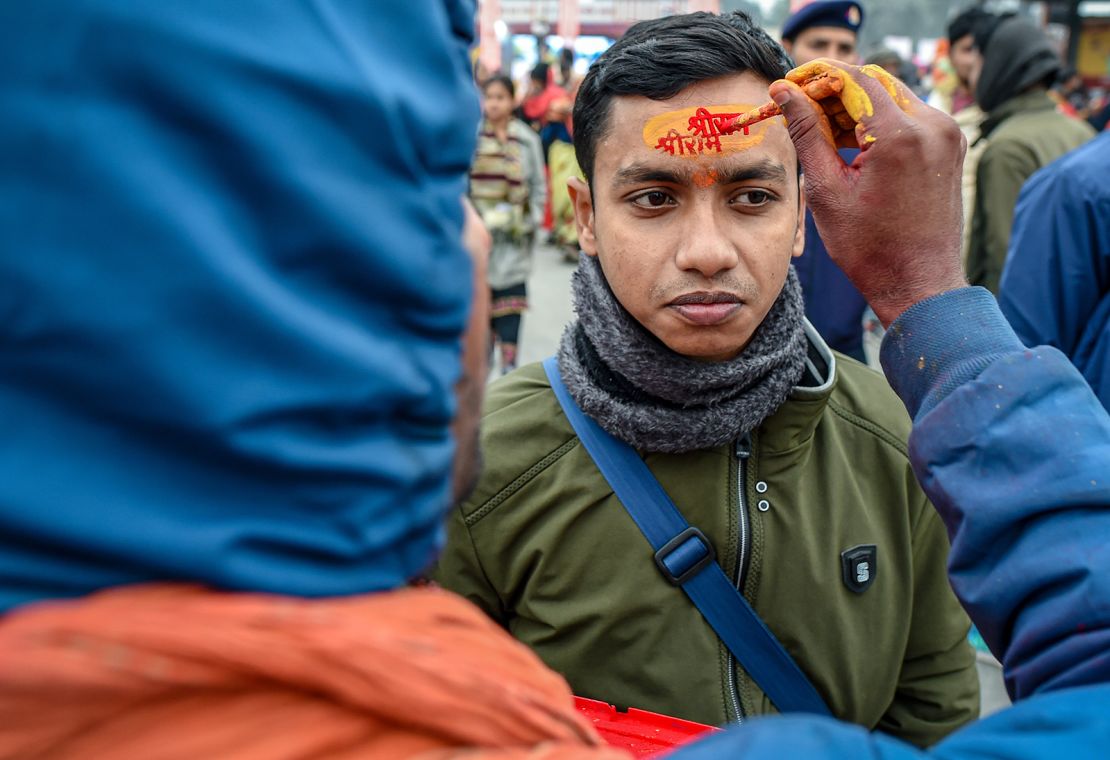
“I have come here to seek blessings from Lord Ram and Sita, I am very happy today,” she said.
Another devotee, Lal Singh Khushwa, told CNN he walked 70 kilometers to visit the temple.
“I have come here to seek blessing from Lord Ram, Modi has done so much,” he said. “I feel very good being here.”
CNN’s Vedika Sud, Aishwarya S Iyer and Sania Farooqui contributed reporting.

